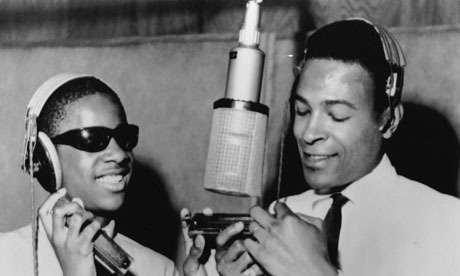First published in The Guardian, September 9, 2013
Stevie Wonder and Marvin Gaye at a Motown recording studio in Detroit in 1965. What other businesses have changed the world? Photograph: Gilles Petard/Redferns
I recently had the pleasure of seeing Motown, The Musical on Broadway. Besides marveling at how great the music (still) is, I realized anew the importance of business to the continuum of history.
As a black-owned business featuring mostly black music, Motown dominated large swaths of the cultural agenda in the late 1960s and 1970s with hundreds of hit records. Although some white people joined blacks on the front lines of the civil rights movement in the early 1960s, the first time non-activist whites socialized with blacks as peers was to Motown soundtracks – on the radio and on the dance floor.
The earlier jazz bands of Duke Ellington, Count Basie and Louis Armstrong were obviously extraordinary and influential too. But these great musicians mostly played to segregated clubs and concert halls, whether legally separate in the South or de facto separated in the North.
Motown’s crossover success was one of the cornerstones of massive changes in politics and society carved by the civil rights movement. Smokey Robinson, a Motown star and vice president, described this transformation to The Times-Picayune reporter Maria C. Montoya in 2009:
“Into the ’60s, I was still not of a frame of mind that we were not only making music, we were making history. But I did recognize the impact because acts were going all over the world at that time. I recognized the bridges that we crossed, the racial problems and the barriers that we broke down with music. I recognized that because I lived it. I would come to the South in the early days of Motown and the audiences would be segregated. Then they started to get the Motown music and we would go back and the audiences were integrated and the kids were dancing together and holding hands.”
From my perspective, Berry Gordy‘s brilliant business was largely responsible for most of my white generation’s exposure to black culture – and it began the process of tearing down some of our parents’ racism. Without his breakthrough music empire, Barack Obama arguably wouldn’t have been elected as president because, without the integration that resulted from the music, too many white people wouldn’t have voted for a black man.
Motown, the company, popularized and delivered black music into the center of white popular culture – globally. In addition to its music, this is Motown’s legacy.
What does all this have to do with sustainable business and history? Plenty.
Motown is not only a delight (of course, it’s playing now to inspire me), but also showcases the power of business to change culture. And it’s not alone. Other businesses also altered the zeitgeist and, in turn, history.
When Apple introduced its first iPhone, it revolutionized our communications patterns, technologies and access, as well as the business model for both the computer and communications industries. And speaking of history: no smart phones, no Arab Spring.
When Searle offered the first birth-control pill for sale in the US in 1960, the company paved the way for the revolution in women’s rights of the second half of the 20th century. The business of medical contraception, worth $5 billion in 2011 just in the US, made childbearing a choice. That’s definitely a key milestone in history.
And sometimes, a business’ influence is more cultural than financial. How many of us know the actual dealings of the Medici political and banking dynasty? Some of us might know that it controlled the papacy and several regions of what is now Italy and France for several centuries. But more of us know it sponsored art, architecture and science by way of Michelangelo, Brunelleschi, Galileo and other great Renaissance artists and scientists.
The power of businesses to change the world extends beyond supply chains, beyond working conditions, beyond their carbon footprints. Cultural impact is just as important and the long reach of this impact can be heard when you listen to your favorite Motown music later today.
What other businesses that have affected the world so potently and distinctly, for better and for worse? What other businesses have fundamentally altered history? I’d love to hear your ideas.





